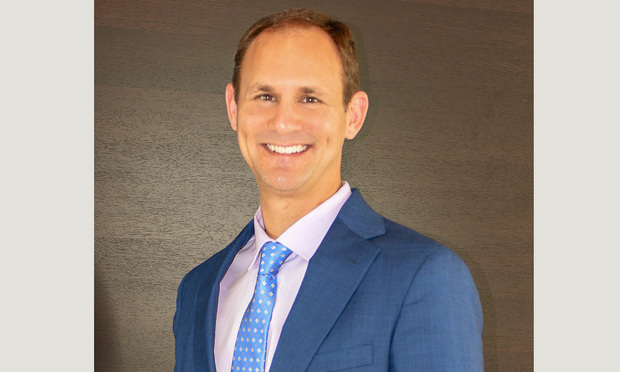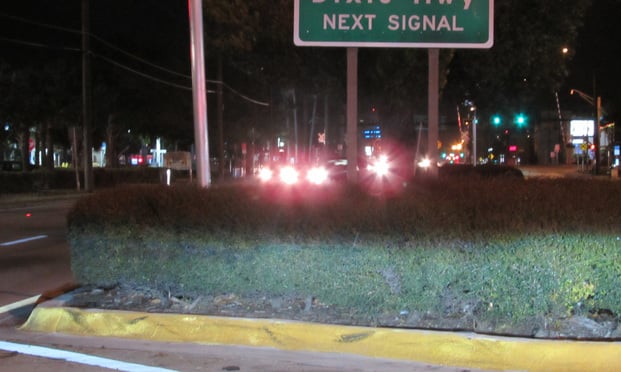No Time to Waste: Broward Lawyer's Quick Action Helps Clinch $5.9M Settlement
The plaintiff motorcyclist alleged the driver that hit him couldn't see properly, thanks to a nearly 3-foot hedge that should have been no more than 2 feet tall.
March 02, 2020 at 12:33 PM
6 minute read
 Eric "Rick" Ellsley of the Ellsley Law Firm in Plantation. Courtesy photo.
Eric "Rick" Ellsley of the Ellsley Law Firm in Plantation. Courtesy photo.
Eric "Rick" Ellsley of the Ellsley Law Firm in Plantation negotiated a $5.95 million settlement with a Florida landscape gardening company over claims unruly hedges on an Oakland Park roadway median caused a crash that left his client with permanent neck, back and arm injuries.
The case demonstrates the importance of preserving evidence and getting experts to the scene as soon as possible—particularly for a visual obstruction lawsuit—as it hinged on photographs and information Ellsley gathered immediately after the accident.
"Personally go to the scene. Personally meet with witnesses and interview [them]. Draw up affidavits based upon what they tell you," Ellsley said. "People quickly forget what they see and hear, so it is important to secure that testimony very early on."
Ellsley's client, 26-year-old motorcyclist Alexander Ramos was driving in the far left lane of Oakland Park Boulevard at about 10 p.m. March 13, 2018, when driver Sharon McLeod made a left turn in front of Ramos, according to plaintiff counsel. A police report said McLeod was doing a U-turn, but hadn't noticed Ramos.
Ramos sued the driver, the city of Oakland Park, the state, and a private landscaping company in May 2019, alleging McLeod's view was hindered by a nearly 3-foot hedge that should have been—under the Florida Department of Transportation Standard Index No. 546 regulation—no more than 2 feet tall.
Ellsley's investigation revealed the Florida Department of Transportation owned the median, and was responsible for its upkeep. But it had transferred that responsibility to the city of Oakland Park, which paid defendant Landscape Service Professionals Inc. to maintain it.
The landscaping company denied that the hedge had anything to do with the crash. It instead accused the plaintiff of negligence, and the driver of carelessness.
 Median on Oakland Park Boulevard at Northeast 10th. Courtesy photo.
Median on Oakland Park Boulevard at Northeast 10th. Courtesy photo.'Factual challenges'
Ellsley's biggest obstacle lay in proving that the landscaping was to blame.
A statement from driver McLeod made that task more difficult. The driver told one officer she hadn't noticed Ramos, but mentioned to another officer that she "could have beaten him across the road," implying the possibility she had seen the plaintiff. The statement was undeniable, as McLeod's interview was recorded on an officer's body cam.
Eye witness evidence also suggested that Ramos, a downtown valet, had been speeding, though not excessively.
McLeod's insurer United Auto Insurance Co. paid its maximum liability limit of $10,000 a few weeks after the crash, while the landscaper's insurer initially agreed to pay $10,000 in medical bills. But it took several months of litigation to resolve the lawsuit with the landscapers and the government.
Ellsley recruited an accident-reconstruction engineer, who found that the height of the hedge would have obstructed both drivers' ability to see ahead of them.
Police also found McLeod at fault for failing to yield to Ramos, who had the right of way, and their report mentioned that the median bushes could have been a factor.
"We built a strong case of liability, despite some of the factual challenges," Ellsley said. "And Mr. Ramos was a likable plaintiff who would present very well in a courtroom."
Ellsley said rehabilitation hasn't been easy for his client, who had to have surgery on his neck and back, and now has limited functionality in his left arm.
Kory Ickler of Garrison, Yount, Forte & Mulcahy in Tampa represented Landscape Service Professionals. He deferred to his client's insurer, the Hanover Insurance Co., which did not immediately respond to a request for comment.
Derek Barba of Wicker Smith in Coral Gables represented driver McLeod, and did not respond to a request for comment by deadline.
Ellsley said the case spotlights a common danger on South Florida public roadways because landscapers rarely measure shrubs and hedges after finishing their work, and many popular landscaping features tend to grow quickly.
"The landscaping companies that contract with the various governmental entities are consistently violating the state codes regarding maximum height of median landscaping," he said. "Not surprisingly, crashes occur because the drivers can't see each other very clearly."
Ellsley handled a similar lawsuit in 2012 involving a crash near Hollywood, in which a cab driver claimed he didn't see an oncoming scooter because of a row of hedges in a median maintained by the Seminole Tribe of Florida. That lawsuit settled for $4 million, and the Seminoles later replaced the bushes with grass.
Related story: Scooter-taxi crash near Seminole Hard Rock settled for $4 million
The best practice for gardeners operating anywhere near roads, in Ellsley's opinion, is to follow the state transportation department's Florida Highway Landscape Guide.
"Decision makers, landscape architects and urban planners should choose grass and not trees, hedges, bushes, or plants for the medians because grass is a much safer alternative for motorists," Ellsley said.
Landscape Services's insurance company has paid the settlement, which was just shy of its $6 million policy limit. The agreement releases all government entities from liability.
Broward Circuit Judge John Bowman is now likely to dismiss the case.
Case: Alexander Ramos v. Landscape Service Professionals
Case No.: CACE19010987
Description: Auto negligence
Filing date: May 21, 2019
Settlement date: Jan. 6, 2020
Judge: Broward Circuit Judge John B. Bowman
Plaintiffs attorney: Eric "Rick" Ellsley, The Ellsley Law Firm, Plantation
Defense attorneys: Kory Ickler, Garrison, Yount, Forte & Mulcahy, Tampa
Settlement amount: $5.95 million
Read more:
Client's Powerful Story Helps Miami-Dade Lawyers Land $1 Million Pre-Suit Settlement
$2.5M Miami Verdict—With No Punitive Damages—Hints at Tricky Tobacco Case
This content has been archived. It is available through our partners, LexisNexis® and Bloomberg Law.
To view this content, please continue to their sites.
Not a Lexis Subscriber?
Subscribe Now
Not a Bloomberg Law Subscriber?
Subscribe Now
NOT FOR REPRINT
© 2025 ALM Global, LLC, All Rights Reserved. Request academic re-use from www.copyright.com. All other uses, submit a request to [email protected]. For more information visit Asset & Logo Licensing.
You Might Like
View All
Tragedy on I-95: Florida Lawsuit Against Horizon Freight System Could Set New Precedent in Crash Cases
2 minute read

Securities Claims Against Lilium N.V. for Electric Plane Production Delays Fail to Take Flight, Federal Judge Holds
5 minute read
Law Firms Mentioned
Trending Stories
- 1Walt Disney, IBM Denied High Court Review of Old NY Franchise Tax Law
- 2The Right Amount?: Federal Judge Weighs $1.8M Attorney Fee Request with Strip Club's $15K Award
- 3Is 1st Circuit the New Center for Trump Policy Challenges?
- 4Justices Grill US Government in Venue Dispute Over FDA Vape Challenges
- 5Change Is Coming With the New Trump Era. For Big Law, Change Is Already Here
Who Got The Work
J. Brugh Lower of Gibbons has entered an appearance for industrial equipment supplier Devco Corporation in a pending trademark infringement lawsuit. The suit, accusing the defendant of selling knock-off Graco products, was filed Dec. 18 in New Jersey District Court by Rivkin Radler on behalf of Graco Inc. and Graco Minnesota. The case, assigned to U.S. District Judge Zahid N. Quraishi, is 3:24-cv-11294, Graco Inc. et al v. Devco Corporation.
Who Got The Work
Rebecca Maller-Stein and Kent A. Yalowitz of Arnold & Porter Kaye Scholer have entered their appearances for Hanaco Venture Capital and its executives, Lior Prosor and David Frankel, in a pending securities lawsuit. The action, filed on Dec. 24 in New York Southern District Court by Zell, Aron & Co. on behalf of Goldeneye Advisors, accuses the defendants of negligently and fraudulently managing the plaintiff's $1 million investment. The case, assigned to U.S. District Judge Vernon S. Broderick, is 1:24-cv-09918, Goldeneye Advisors, LLC v. Hanaco Venture Capital, Ltd. et al.
Who Got The Work
Attorneys from A&O Shearman has stepped in as defense counsel for Toronto-Dominion Bank and other defendants in a pending securities class action. The suit, filed Dec. 11 in New York Southern District Court by Bleichmar Fonti & Auld, accuses the defendants of concealing the bank's 'pervasive' deficiencies in regards to its compliance with the Bank Secrecy Act and the quality of its anti-money laundering controls. The case, assigned to U.S. District Judge Arun Subramanian, is 1:24-cv-09445, Gonzalez v. The Toronto-Dominion Bank et al.
Who Got The Work
Crown Castle International, a Pennsylvania company providing shared communications infrastructure, has turned to Luke D. Wolf of Gordon Rees Scully Mansukhani to fend off a pending breach-of-contract lawsuit. The court action, filed Nov. 25 in Michigan Eastern District Court by Hooper Hathaway PC on behalf of The Town Residences LLC, accuses Crown Castle of failing to transfer approximately $30,000 in utility payments from T-Mobile in breach of a roof-top lease and assignment agreement. The case, assigned to U.S. District Judge Susan K. Declercq, is 2:24-cv-13131, The Town Residences LLC v. T-Mobile US, Inc. et al.
Who Got The Work
Wilfred P. Coronato and Daniel M. Schwartz of McCarter & English have stepped in as defense counsel to Electrolux Home Products Inc. in a pending product liability lawsuit. The court action, filed Nov. 26 in New York Eastern District Court by Poulos Lopiccolo PC and Nagel Rice LLP on behalf of David Stern, alleges that the defendant's refrigerators’ drawers and shelving repeatedly break and fall apart within months after purchase. The case, assigned to U.S. District Judge Joan M. Azrack, is 2:24-cv-08204, Stern v. Electrolux Home Products, Inc.
Featured Firms
Law Offices of Gary Martin Hays & Associates, P.C.
(470) 294-1674
Law Offices of Mark E. Salomone
(857) 444-6468
Smith & Hassler
(713) 739-1250






